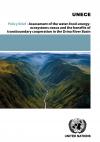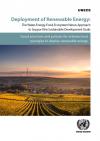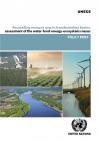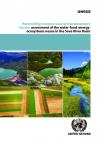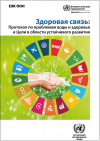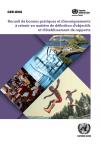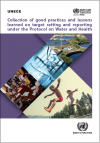Publications
Displaying Results 141 - 160 of 646
- English
This policy brief synthesizes the main findings and recommendations from the assessment of the water-food-energy-ecosystems nexus, linked with a study of benefits of transboundary cooperation, in the Drina River Basin, mainly shared by Bosnia and Herzegovina, Montenegro and Serbia which was carried out from 2016 to 2017 in the framework of the UNECE Water Convention’s Programme of Work.
- English
The 2030 Agenda for Sustainable Development includes Sustainable Development Goal (SDG) 7 on access to energy and the related targets set the ambition for increasing the share of renewable energies in the energy mix. Their achievement is closely linked water management (part of SDG 6 on water and sanitation) but also to many other SDGs, notably on food security and sustainable agriculture (SDG 2
- English
The brochure has been prepared by the Inter-Agency Coordination Group for Industrial and Chemical Accidents. The Inter-Agency Coordination Group is an informal forum that brings together international organizations and institutions working on the prevention of, preparedness for and response to
- English
By providing an intergovernmental science and policy platform for reducing air pollution and its impacts, including climate change, the Air Convention contributes to the attainment of 11 of the SDGs.EN
- English
Convention on the Transboundary Effects of Industrial Accidents - as amended on 15 December 2015Full Text
- English
This policy brief provides an introduction towards the different stages of and benefits from an assessment of the water-food-energy-ecosystems nexus, with a specific focus on resource use in transboundary basins. It summarizes the experience from the first three transboundary basins where a methodology for participatory assessment of intersectoral linkages, trade-offs and benefits in
- English
Industrial accidents can happen anywhere, anytime. Often, they have severe consequences on human health and the environment, including in other affected countries. The UNECE Industrial Accidents Convention helps its Parties to prevent industrial accidents, especially those with transboundary effects, and to prepare for and respond to such accidents if they occur. This brochure explains why
- English
This policy brief synthesizes the main findings and recommendations from the nexus assessment of the Sava River Basin shared by Bosnia and Herzegovina, Croatia, Montenegro, Serbia and Slovenia which was carried out from 2014 to 2016 in the framework of the UNECE Water Convention’s Programme of Work.
The assessment aimed to foster transboundary cooperation by identifying intersectoral
- English
Coordination between the water, energy, food and environment sectors is fraught with difficulties at the national level and the complexity increases substantially in transboundary basins. The “nexus approach” to managing interlinked resources has emerged as a way to enhance water, energy and food security by increasing efficiency, reducing trade-offs, building synergies and improving governance,
- English
Coordination between the water, energy, food and environment sectors is fraught with difficulties at the national level and the complexity increases substantially in transboundary basins. The “nexus approach” to managing interlinked resources has emerged as a way to enhance water, energy and food security by increasing efficiency, reducing trade-offs, building synergies and improving governance
- English
The document aims to provide Parties with guidance in identifying the best abatement options for mobile emission sources, with particular reference to best available techniques, so as to assist them in meeting the obligations of the 1999 Protocol to Abate Acidification, Eutrophication and Ground-level Ozone.English
- English
This report provides an overview of hazard rating systems used by competent authorities in various UNECE member States for prioritising resources and directing attention to chemical hazard sites and industries where it is most needed. The report describes each system without attempting to analyse or compare differences or similarities. The purpose of the report is to give countries insight
- English
The checklist for contingency planning for accidents affecting transboundary waters was prepared by the Joint Ad Hoc Expert Group on Water and Industrial Accidents, following a decision by theConference of the Parties to the Convention on the Transboundary Effects of Industrial Accidents (Industrial Accidents Convention) at its sixth meeting (The Hague, 8–10 November 2010) and theMeeting of
- Pусский
Water, sanitation and health are at the core of the 2030 Agenda for Sustainable Development.The 1999 Protocol on Water and Health is a powerful tool to promote and operationalize the achievement of the 2030 Agenda and its Sustainable Development Goals. With its strong integrated and intersectoral approach, its focus on prevention and on the whole water cycle and its attention to safety and
- English
Water, sanitation and health are at the core of the 2030 Agenda for Sustainable Development.The 1999 Protocol on Water and Health is a powerful tool to promote and operationalize the achievement of the 2030 Agenda and its Sustainable Development Goals. With its strong integrated and intersectoral approach, its focus on prevention and on the whole water cycle and its attention to safety and
- Français
The Guidance Note on the development of action plans aims to help countries in translating the priorities identified through the self-assessment into actions. Specific Equitable Access Action Plans are needed to guide country (or sub-national entity) efforts to achieve equitable access to water and sanitation by identifying priority actions to be implemented and ways of implementing them. The
- English
The Guidance Note on the development of action plans aims to help countries in translating the priorities identified through the self-assessment into actions. Specific Equitable Access Action Plans are needed to guide country (or sub-national entity) efforts to achieve equitable access to water and sanitation by identifying priority actions to be implemented and ways of implementing them. The
- Pусский
The Guidance Note on the development of action plans aims to help countries in translating the priorities identified through the self-assessment into actions. Specific Equitable Access Action Plans are needed to guide country (or sub-national entity) efforts to achieve equitable access to water and sanitation by identifying priority actions to be implemented and ways of implementing them. The
- Français
The objective of the Collection of good practices and lessons learned on target setting and reporting under the Protocol on Water and Health is to provide concrete advice to countries planning to embark on the process of setting, revising or implementing targets, and reporting on the progress achieved in accordance with the Protocol.
In 2010,
- English
The objective of the Collection of good practices and lessons learned on target setting and reporting under the Protocol on Water and Health is to provide concrete advice to countries planning to embark on the process of setting, revising or implementing targets, and reporting on the progress achieved in accordance with the Protocol.
In 2010,


